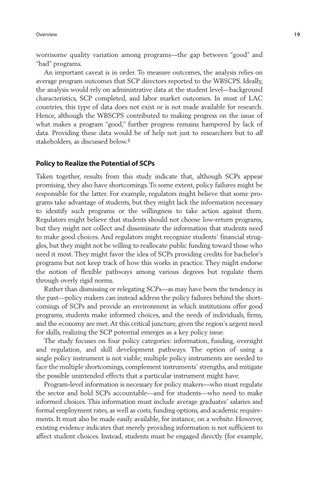Overview
worrisome quality variation among programs—the gap between “good” and “bad” programs. An important caveat is in order. To measure outcomes, the analysis relies on average program outcomes that SCP directors reported to the WBSCPS. Ideally, the analysis would rely on administrative data at the student level—background characteristics, SCP completed, and labor market outcomes. In most of LAC countries, this type of data does not exist or is not made available for research. Hence, although the WBSCPS contributed to making progress on the issue of what makes a program “good,” further progress remains hampered by lack of data. Providing these data would be of help not just to researchers but to all stakeholders, as discussed below.6
Policy to Realize the Potential of SCPs Taken together, results from this study indicate that, although SCPs appear promising, they also have shortcomings. To some extent, policy failures might be responsible for the latter. For example, regulators might believe that some programs take advantage of students, but they might lack the information necessary to identify such programs or the willingness to take action against them. Regulators might believe that students should not choose low-return programs, but they might not collect and disseminate the information that students need to make good choices. And regulators might recognize students’ financial struggles, but they might not be willing to reallocate public funding toward those who need it most. They might favor the idea of SCPs providing credits for bachelor’s programs but not keep track of how this works in practice. They might endorse the notion of flexible pathways among various degrees but regulate them through overly rigid norms. Rather than dismissing or relegating SCPs—as may have been the tendency in the past—policy makers can instead address the policy failures behind the shortcomings of SCPs and provide an environment in which institutions offer good programs, students make informed choices, and the needs of individuals, firms, and the economy are met. At this critical juncture, given the region’s urgent need for skills, realizing the SCP potential emerges as a key policy issue. The study focuses on four policy categories: information, funding, oversight and regulation, and skill development pathways. The option of using a single policy instrument is not viable; multiple policy instruments are needed to face the multiple shortcomings, complement instruments’ strengths, and mitigate the possible unintended effects that a particular instrument might have. Program-level information is necessary for policy makers—who must regulate the sector and hold SCPs accountable—and for students—who need to make informed choices. This information must include average graduates’ salaries and formal employment rates, as well as costs, funding options, and academic requirements. It must also be made easily available, for instance, on a website. However, existing evidence indicates that merely providing information is not sufficient to affect student choices. Instead, students must be engaged directly (for example,
19
